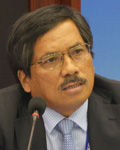
President Xi Jinping's "Four Comprehensives" do not only impact China domestically, but will also positively affect other countries, especially in Asia. Three out of the "Four Comprehensives" certainly have had exerted a strong influence in Asia. Greater reform transforming China into a developed economy will doubtlessly benefit the rest of the continent at large.
As China undergoes economic transition into a more matured economy, its growth target is still relatively high--around 7 percent in 2015, despite slowing down from 7.4 percent in 2014. The national economy will be driven more by domestic consumption as people become more prosperous, and less by investment especially state-led infrastructure development. The reform will strengthen the mixed economy, within which the state's role will be strengthening market mechanisms that allocate resources in a more efficient way.
China is capable of developing a system where state and market mechanisms can be integrated and complementary. Market mechanisms increase efficiency through competition. Meanwhile, the role of the state is to safeguard the rule of law and make sure that growth can go hand in hand with equity. Many developing countries have floundered by liberalizing their economy too fast and too far to the degree that instead of becoming an advanced market-based economy, they end up with an economy that is dominated by an oligarchy and consequently suffer from a high income inequality.
Many countries have also fallen into what is called the"middle income trap." They have failed to transform from investment driven into innovation driven economy. Human resources and technological capabilities are not sufficient to support the growth of a more innovative, sophisticated economy. In addition, a weak legal system cannot facilitate further economic development.
President Xi's initiative will enable China to avoid falling into the pitfalls others have in attempts to transform their economies.
Currently China is the No.2 economy in the world. Many economists are convinced that China will be the No.1 economy by 2020 or even earlier. These timely reforms will lead an economy whose growth, though no longer in double digits, is still relatively fast into a new era of productivity growth and innovation.
The success of China's economic transformation would bring a lot of benefit to other countries in the region that are the main trade partners of China. China will no longer primarily engage in exporting low-end manufactured products, but will instead produce higher quality output and invest more in other countries in the region, which will lead to more balanced trade and investment and shared prosperity overall.
As for its political development, China certainly will not follow the path of forming a liberal democracy like India and Indonesia who have seen their economic development hindered by open conflicts and shortsighted policies. Instead, China will look to strengthen Party discipline and accountability while maintaining representation of the people. A political system that is supported by rule of law can eradicate corruption. This would be a model engendering positive correlation between accountable politics and sustainable development.
Certainly, the challenges the Chinese government face in transforming the economy into a developed one while remaining sustainable are manifold. Critics doubt whether China will be able to manage the debt of state-owned companies and transform them into more competitive entities. However, full blown privatization is not an option, as many countries have tried it and failed miserably. The solution is maintaining ownership of SOEs in the hands of the government, but also introducing more transparent and accountable management similar to public companies.
All eyes, both domestic and international, are looking to the implementation of President Xi's "Four Comprehensives." Even critics admit to the possibility of its success if certain measures are taken seriously. China will certainly attempt to boost its potential for success while minimizing any potential for disruptions.
The author is chairman of the Center for Information and Development Studies in Jakarta, Indonesia
Copyedited by Kieran Pringle
